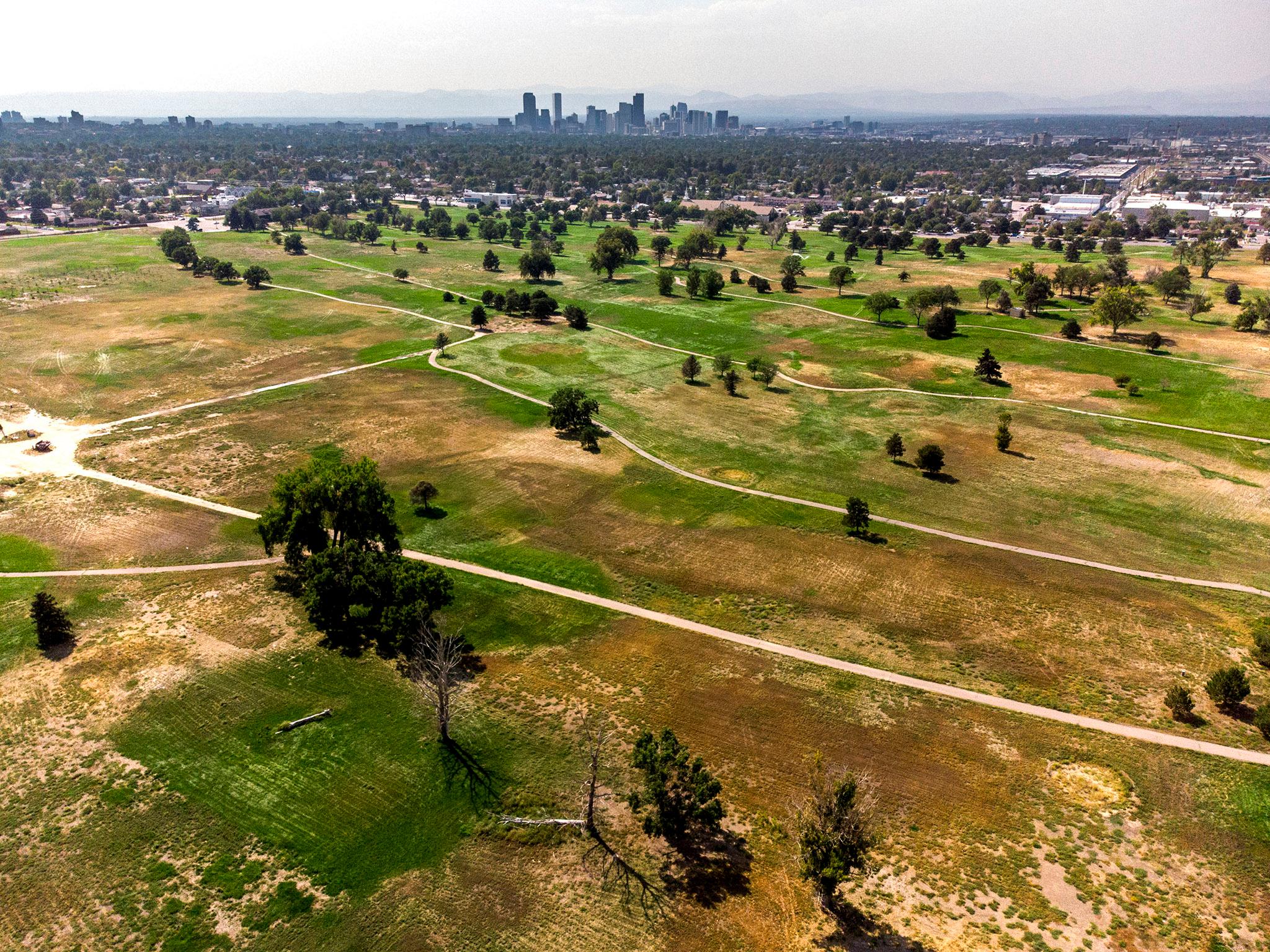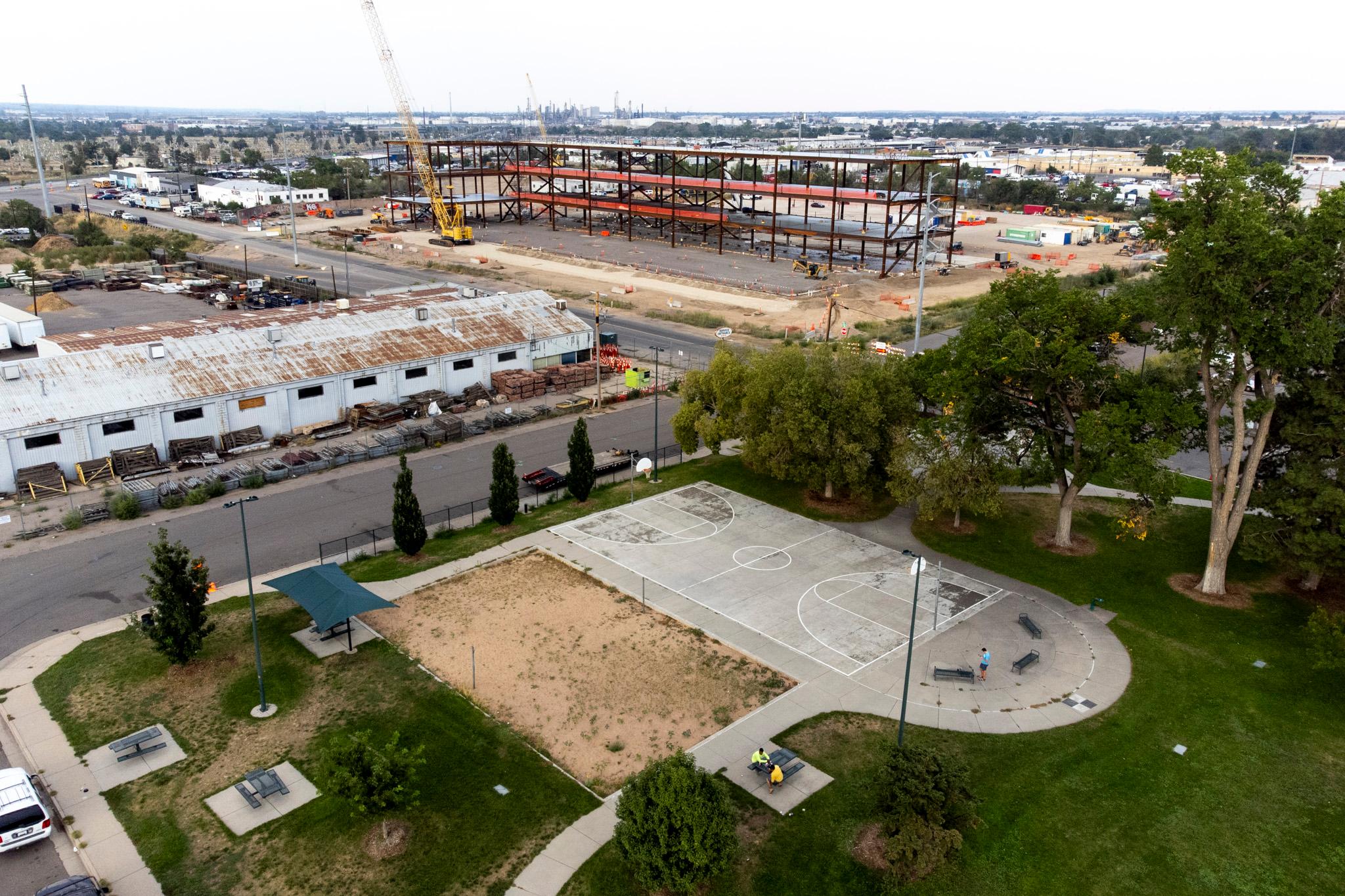Few developments in Denver's history have caused a city-wide stir like Westside Investment Partners' attempt to turn a former golf course on 155 acres of Northeast Park Hill into a massive mixed-use development with affordable and market-rate housing, park space and retail.
The land, which was long operated as a fee-based golf course and was inaccessible to free public use, is protected by a city-owned perpetual conservation easement that limits its use to an 18-hole, fee-based, public golf course along with other recreational purposes (assuming they don't interfere with the golf course). The course has been closed since the end of 2018.
Westside -- a major backer of Mayor Michael Hancock and many current City Council members -- bought the land from the George W. Clayton Trust in 2019 with the hopes of developing the 155 acres. For that to happen, the conservation easement would need to be extinguished, which the Hancock administration seemed committed to doing.
But the public objected. In 2022, voters approved Initiated Ordinance 301, a measure promoted by opponents of the land's redevelopment that made public approval required in order to lift a city-owned conservation easement.
Ever since, the proposed development wound its way through City Council, which passed multiple related measures, including rezoning the land, approving a small area plan, creating municipal districts, and approving a legally binding development agreement laying out terms that Westside pledged to follow.
Council also referred Question 2O to voters that, if passed, would give public permission to the city to lift the conservation easement, making way for Westside's project -- assuming the attempt to lift the easement isn't blocked in court.
So, here Denverites are, in 2023, deciding whether to allow the city to lift the conservation easement and make way for the new development.
Here's the language you'll see on the ballot.
How would it work?
There are two parts of the measure to consider.
The first is that if the public votes yes on 2O, the City and County of Denver will be allowed -- at least, by voters -- to extinguish the city-owned and taxpayer-funded perpetual conservation easement that limits how the Westside-owned land can be used. The voters' decision could be contested in court and how a judge would rule is unknown.
If the vote passes, the City's plan is to briefly take over ownership of the golf course from Westside, lift the easement, and return the land to the developer immediately. Opponents say this strategy undermines the legal protection a publicly funded conservation easement should offer. They hope a judge will rule against both this plan and the possible end of the conservation easement.
That land, as the text on the conservation easement reads, is currently required to be a regulation-sized 18-hole golf course and can include other recreational activities. As long as it's possible for it to be operated as a golf course, golf must be its primary use -- unless the easement is lifted or amended, as some opponents of the Westside development have proposed.
The second part of the measure states that voters approve both commercial and residential development and explains what that would include: "affordable housing," which, in this context, means income-restricted housing, and also a public regional park, trail and open space.
This second part of the measure doesn't actually do much. It's basically a way for the architects of this measure to communicate to the public what Westside plans to do. There is nothing for voters to allow, beyond the city extinguishing the easement.
In fact, the planning work is already wrapped. To the objections of the development's opponents, City Council has rezoned the land, approved a Park Hill Golf Course site development plan, created Municipal Districts that will create a funding mechanism for funding infrastructure for the project, and entered into a development agreement with the city.
If the easement is extinguished and the plan goes through, Westside could create more than 3,000 homes in Northeast Park Hill, 75% of which will be market rate, and the rest will be income-restricted. The area would boast the fourth largest park in the metro area, and the developer would fund that. Buildings could be between four and 12 stories high, depending on their location on the site.
If this measure does not pass, it's possible that Westside would sit on the land, and it would remain vacant as it has since 2018. The company could also run a golf course on the site, essentially making the land inaccessible to all but fee-paying golfers.
Westside would not, necessarily, agree to sell the 155 acres to the city, as some opponents hope, so there are no guarantees the land would become a park.
Who's for 2O?
The developer Westside has invested millions buying the land and advancing the project. The developer's leaders have spent countless hours in community meetings attempting to craft a compromise plan that includes all community members' interests. Westside will make a huge profit if the project goes through.
Other developers working on the project, including the Holland Partner Group, Habitat for Humanity and Brothers Redevelopment, have committed to developing the site and will also have big wins if voters lift the easement.
Hancock's administration has pushed this project, as has Laura Aldrete, the head of Community Planning and Development, who thanked the mayor in a December 6 email for "unwavering support."
She described the adoption of the Park Hill Golf Course Area Plan as "a sweet victory considering the challenge before us." After thanking Parks and Recreation head Happy Haynes for her support and the City Attorney's Office for finding a legal path to push the redevelopment, she wrote, "There is levity and a skip in our step..."
Kevin Marchman, the president of the Northeast Park Hill Coalition and former head of the Denver Housing Authority and a former assistant secretary for the U.S. Housing and Urban Development, supports the project.
He notes, in comments submitted to the Clerk and Recorder's Office, that 2O will create much-needed affordable housing and Denver's fourth-largest park. He added the site is and has always been privately owned. Because Northeast Park Hill is a food desert, a grocery store is needed and the site guarantees space for one (though a grocery store is not guaranteed). The project will also include $150,000 for funding jobs and workforce development for local businesses. These commitments to the community are codified in "a legally enforceable development agreement" with the city.
Who's against it?
The main group opposing the redevelopment of the Park Hill Golf Course site is Yes for Parks and Open Space, whose slogan is "Developers can't buy Denver." The group describes the current struggle to defeat 2-O as "the final round in the fight to preserve open space" and the developer and city as "Goliath."
This group wants the entire land to be converted from a golf course to a park. This vision is based on a legal theory that the conservation easement's purpose is to preserve open space and recreation -- not golf. Proving the validity of that theory would likely require a city-backed amendment of the easement to strip golf requirements from the contract and a likely court battle.
Save Open Space and other opponents of the development filed a lawsuit in February to block Westside's efforts. Individuals backing the lawsuit include former City Council member Rafael Espinoza, community activist Jeff Fard, Tate, and Denver School Board member Xochitl Gaytan. The defendants in the suit include Hancock, the city, City Council and ACM Park Hill JV VII LLC, a subsidiary of Westside.
"While the proposed development is completely antithetical to any of the conservation purposes that are defined in and protected by the 2019 Conservation Easement, this process has proceeded, at considerable taxpayer expense, without any request for a court determination conservation easement intact," the suit states.
What's the group's hope?
"Our ultimate goal is to have the City purchase the land for a fabulous regional park paying no more than the fair market value of the land as encumbered by the PHGC Land Conservation Easement," according to its website.
Former state senator and current City Council candidate Penfield Tate III, and Denver mayoral candidate Lisa Calderón have been vocal opponents from the beginning of the project. Mayoral candidate Ean Thomas Tafoya has also spoken at City Council about his concerns about the development.
Park Hill residents have been divided on the issue.
Opponents argue the land could be better used to improve the city's tree canopy and that open space serves as the city's lungs.
Proponents of the project characterize Save Open Space and the opponents as anti-housing. But many opponents of the golf course redevelopment have pointed to the industrial part of Northeast Park Hill, less than a block from the golf course, and other nearby neighborhoods along the A Line.
That part of the neighborhood includes many empty parking lots and one-story industrial buildings ripe for dense, mixed-use development. Why take over 155-acres of potential park when there is so much underused land nearby they ask?
Some opponents of the Park Hill Golf Course redevelopment argue that with much-needed housing already coming to the area around the 40th and Colorado A Line stop, a public park would be a crucial amenity and that the city should have the foresight to create one. Preserving parks and building housing shouldn't be viewed as mutually exclusive, opponents note.
The Denver Post editorial board also came out against the redevelopment, arguing that city officials are handing over a valuable public asset, the conservation easement, to a developer and not getting a good deal. The easement's value, the Denver Post estimates, is $184 million. The city, the editorial board argues, failed to assess the value. While the paper acknowledged that voting no on the deal could result in the land being abandoned for years, the editorial board argued the city should assess the easement's value, go back to the table, renegotiate a better deal and revisit the issue with voters in November.
Need more help voting? Check out the rest of our voter guide here.












